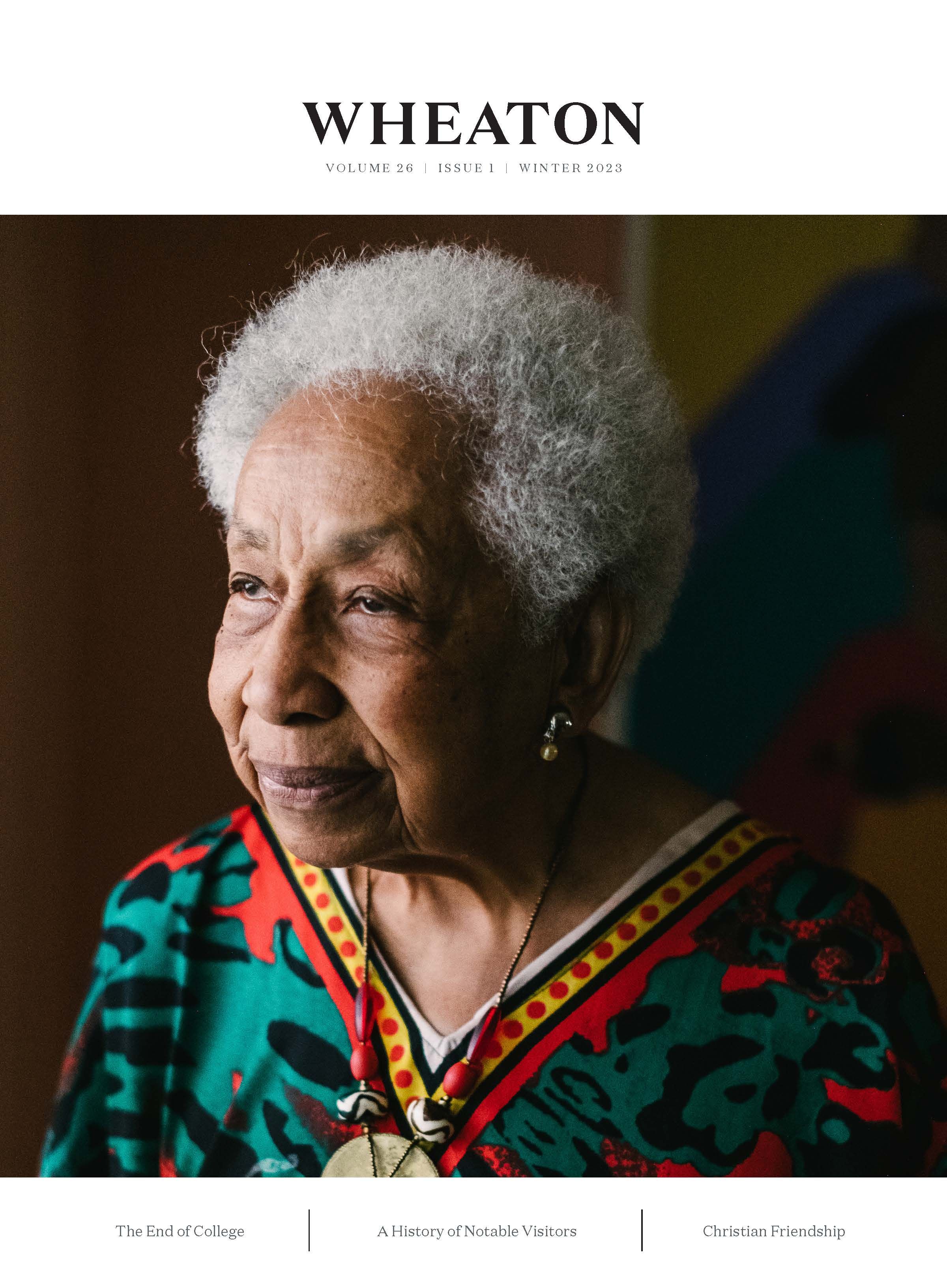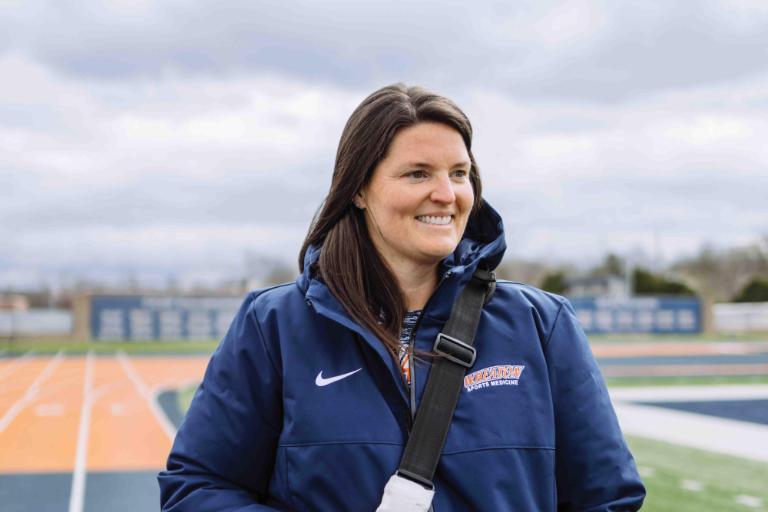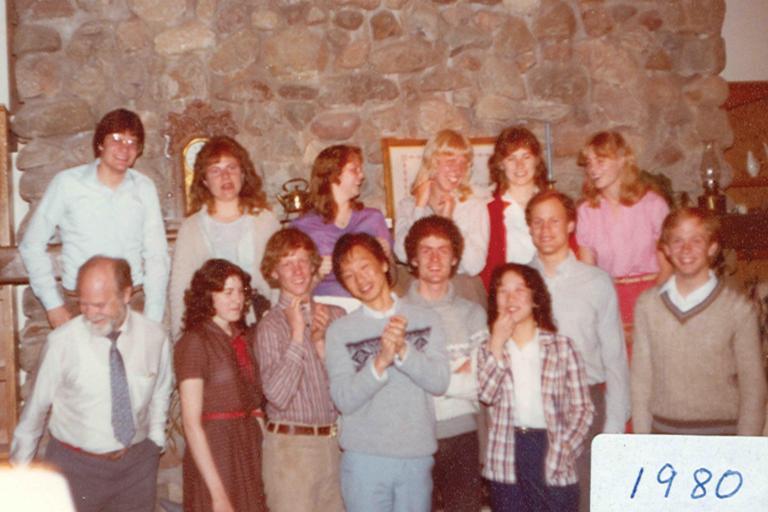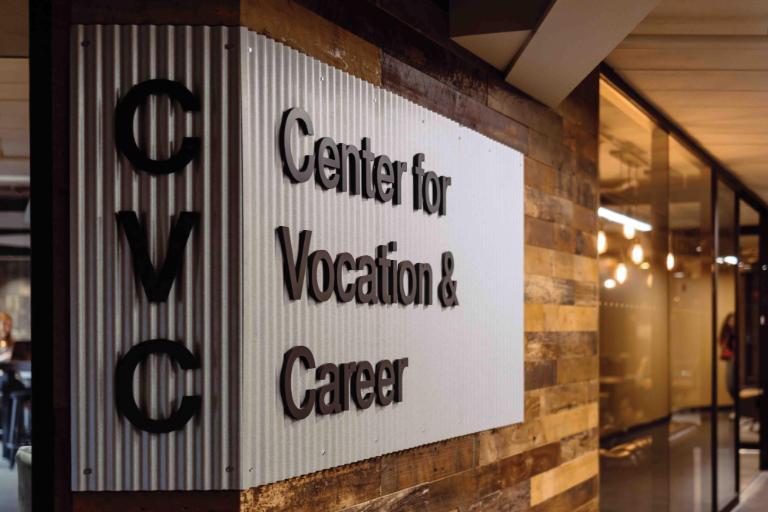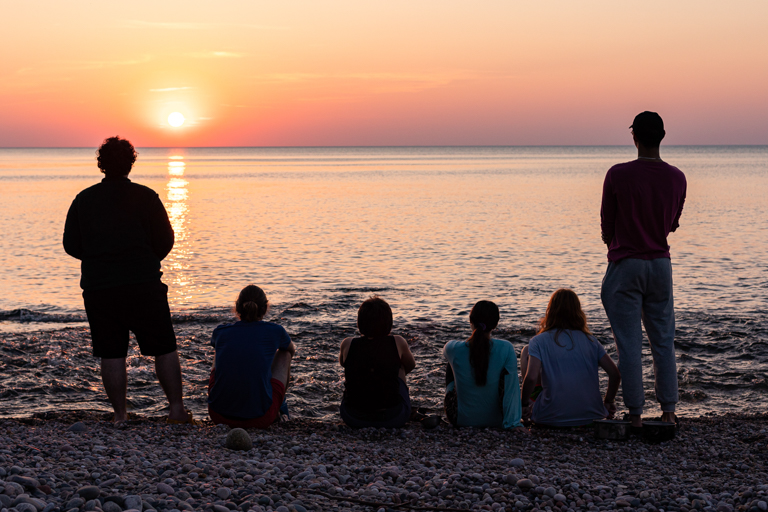In a Society that Undervalues Friendship, Christ Calls His Followers “Friends”
How a faithful practice of friendship can transform our communities and point to Christ
Words: Liuan Chen Huska ’09
Photos: Tony Hughes
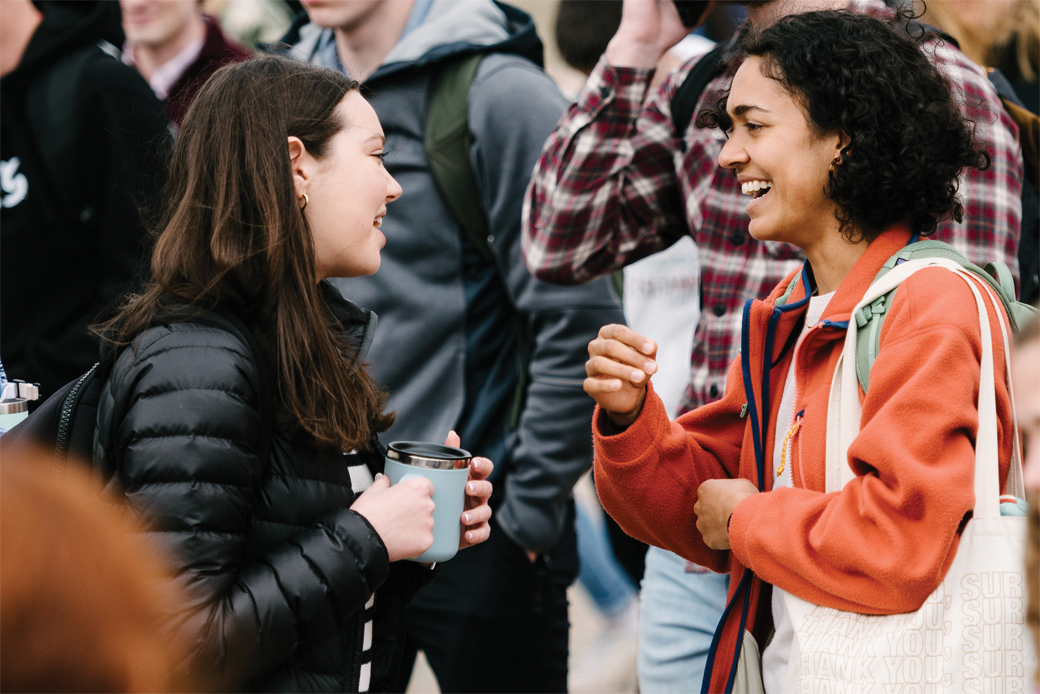
Relationship scholars often point to one befuddling set of findings. When people are asked to name what makes their lives satisfying, friendship typically ranks very high on the list. In practice, however, people make less effort to develop friendships.
“It’s massively contradictory,” said Associate Professor of Communication Dr. Emily Langan ’94. “We think it’s super important that friendship happens, yet we don’t do anything to make it happen.”
In 2008, Langan and Associate Professor of Christian Formation and Ministry Dr. Barrett McRay ’83, M.A. ’86, M.A. ’95, Psy.D. ’98 studied friendships on Wheaton College’s campus as part of their task to develop a weeklong, college-wide curriculum on friendship. Langan wondered how Wheaton friendships would map onto the broader research. To answer her question, they surveyed over 2,000 people on their friendship patterns and networks, including undergraduates, graduate students, faculty, administrators, and staff.
They found that, at the time, the Wheaton community’s posture toward building friendships reflected similar trends in other social research. In the Wheaton survey and other studies, people often said they lacked time to develop friendships. Also, the general inverted life cycle curve of friendships—in which the number of friends is highest in college years and dips into your 40s before rising again—also held for the campus community.
Yet as Langan emphasized, Christians have an advantage when developing friendships—one that could make their relationships more enduring. A shared orthodoxy and orthopraxy—a set of beliefs and practices held in common—automatically puts people on the next relational level without having to work at it, Langan said.
Dan Haase ’97, M.A. ’02 Associate Lecturer of Christian Formation and Ministry, points to Jesus’ words to his disciples in John 15:15: “I have called you friends, for everything that I learned from my Father I have made known to you (NIV).”
For Haase, the practice of Christ-centered friendship is key in a society that’s become increasingly polarized and divided and generally lacks the ability to handle differences. For Christians, a shared faith in Christ creates a hospitable space for dialogue. “There’s a center, and we can have our conversation through that center,” he said. “It’s amazing how that space can hold very profound tears—a deep sense of not truly being accepted in the way you want to be accepted. It’s amazing what human beings are capable of holding when Christ is at the center.”
Many students, faculty, and staff have experienced these transformative moments at Wheaton. The question, then, becomes how to practice this kind of friendship throughout a lifetime, even as specific relationships wax and wane and society pushes us to prioritize families, careers, and individual goals.
MODERN CHALLENGES TO FRIENDSHIP
From ancient philosophers to modern theologians, great thinkers have waxed eloquent on the value of friendship. The Greek philosopher Aristotle, for instance, famously said, “What is a friend? A single soul dwelling in two bodies.” Today, however, a person can have thousands of so-called friends on social media. Some wonder if our modern circumstances have fundamentally changed the nature of friendship.
Associate Professor of English Dr. Richard Gibson has studied how the history of friendship and the history of technology interweave. In his 2019 Hedgehog Review article “Technology and Modern Friendships,” Gibson noted that the ancient Greeks saw all friends as backyard friends. “Someone like Plato or Aristotle could only imagine friendship as something that could happen in a local, intimate space. They didn’t have a postal service, telephones, or internet,” Gibson said.
While some think the digital age has destroyed friendships, Gibson is more ambivalent. He observes that we have always used technologies to facilitate modern friendships, from writing a letter to sending a text message. “The history of friendship is the history of attempts to find intimacy through whatever media are available to us,” Gibson said. “There are both perils and possibilities to where we are now.”
Gibson, for instance, remains close to friends he hasn’t seen in years through text messages and phone calls. A seemingly trivial act, like sending a friend a picture of his child doing something ridiculous, still serves to maintain a deep connection that first formed offline.
Professor of Sociology Dr. Brian Miller ’04 found a similar function for digital connections in research he co-published in the journal Information, Communication & Society in 2015. Studying how emerging adults use social networking sites like Facebook, he found these sites did not always diminish offline relationships. “Most people continue their offline relationships through an online medium,” he said. Although the young adults in his study could articulate the downsides of social media, such as taking up too much time and interfering with other aspects of life, they consistently reported, “I can’t lose these connections.”
While young people keep up their relationships online, Miller continued, “it’s a different question to ask whether that connection is the same.” Technology scholars, such as Massachusetts Institute of Technology’s Sherry Turkle, caution that many shallow “sips” of digital connections don’t add up to the same thing as a long, deep draught of face-to-face conversation.
But digital media isn’t the only challenge to friendships. Miller researches yet another potential peril: the American suburbs.
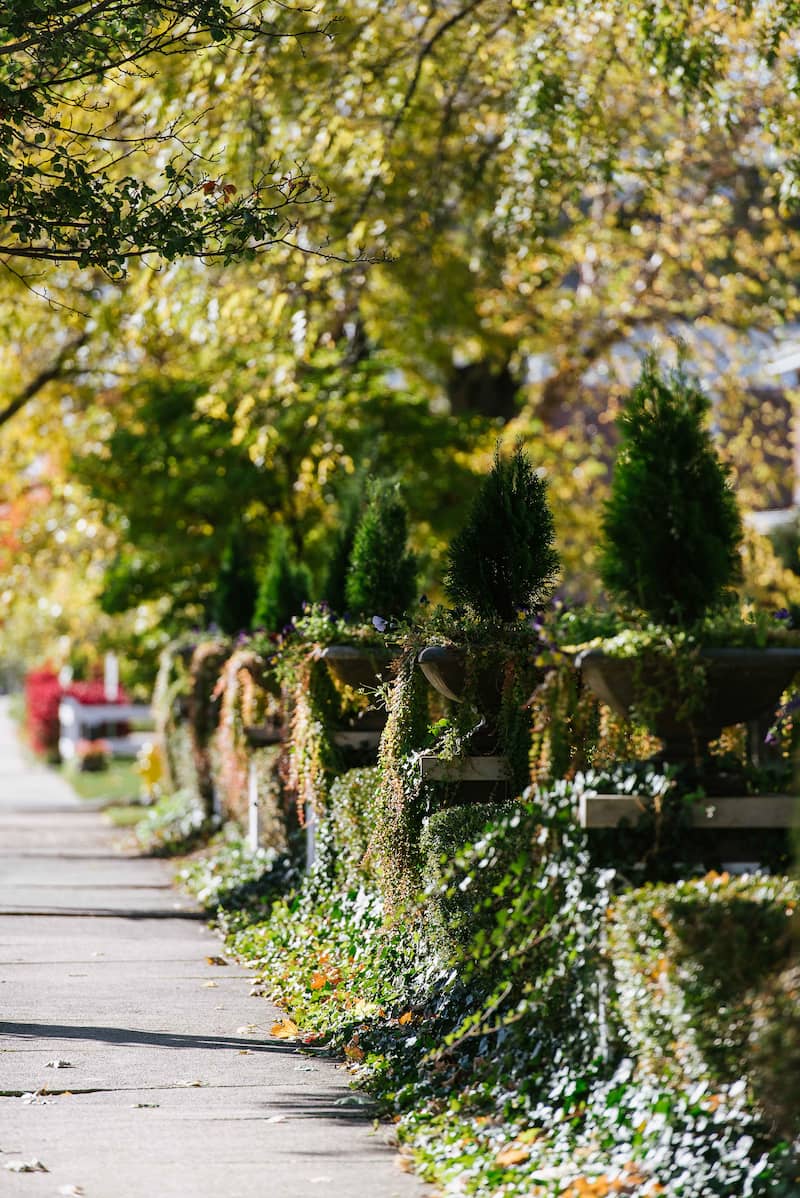
Sidewalk view around Wheaton campus.
Developers began mass producing tracts of parklike suburban housing in the 1920s, and the trend burgeoned after WWII. All along, sociologists have found that parents move to the suburbs in large part for their children’s success. Those goals shaped the housing structure in these new developments, which featured single-family homes and activities centered on nuclear families of parents and children.
“Suburbia is so individualized, privatized, and family-oriented,” said Miller. “Relationships beyond those boundaries are seen as bonuses or good things to have, but not necessary.”
The arrangement of the American suburbs also narrows a person’s potential pool of friends. “When you’re making decisions based on schools, quality of life, and affordability, you end up preselecting your social relationships and possible friends,” Miller said.
In this milieu, Miller said, many Americans end up making friends based on two things: geographic proximity or shared interests. For example, one might find friends at grocery stores, local parks, or children’s activities like schools and sports. But even proximity and shared interests are not enough to push people into deeper friendships, as Langan has found.
Langan’s current research focuses on youth sports parents. Her driving questions explore whether parents who spend lots of time together at their children’s athletic practices and games ended up becoming friends. Disappointingly for her, the answer is no.
“I’ve been surprised at how infrequently relationships are developed in the context of other events,” she said. “We think friendships occur naturally in certain environments—we go to the same church, we have the same hobby—but when the similar interest is something that my family does, the family trumps the friend.”
In other words, Langan is discovering that getting from superficial acquaintance to friendship requires more than being side by side with a person. Friendship requires some sense of attraction and commitment. “You have to have some propulsion, something that draws you to that person,” she said.
THE MISSING INGREDIENTS: INTENTIONALITY, TRUST, HOSPITALITY
Wheaton’s residential setting, where most students live on campus in shared dorms, apartments, or houses, removes some of the barriers to friendship we face in modern society.
“A residential college experience like Wheaton is one of the rarest opportunities you might have in your life to be in really tight quarters with people who are quite different from you,” said Associate Professor of Theology and Urban Studies Dr. Greg Lee. “Being in dorms together, living together, sharing meals together, and being in class together with people of very different backgrounds affords you the opportunity to develop lifelong friendships and communities.”
Faculty members observe that students often don’t recognize how unique the college years are for forming friendships. “Adults just have less time to be with their friends,” Gibson said.
According to the literature on friendship, people maintain the highest saturation of friends when they are college-aged. Then the number drops as people start careers, pair with significant others, and have children. For young alumni, that transition can come as a surprise. Langan encourages students to enjoy the college years when they have the most opportunities to make and keep the friendships that will endure in later life stages when friends are harder to come by. Still, being together all the time in college doesn’t necessarily translate into relational depth. For that, other ingredients are required.
Different faculty members have different ways of describing the missing ingredients. For Haase, the key word is intentionality. “Intentionality is a biblical concept,” he said. “It’s thoughtfully constructing how I’m going to do my days and life. You can do a whole lot of living with a human being in the same dorm space and get to the end of the year and not necessarily know them.”
Intentionality could look like asking, “What if we had a meal together every Tuesday night? What if we asked a meaningful question at the table?”
“All of a sudden,” Haase said, “you’re known.”
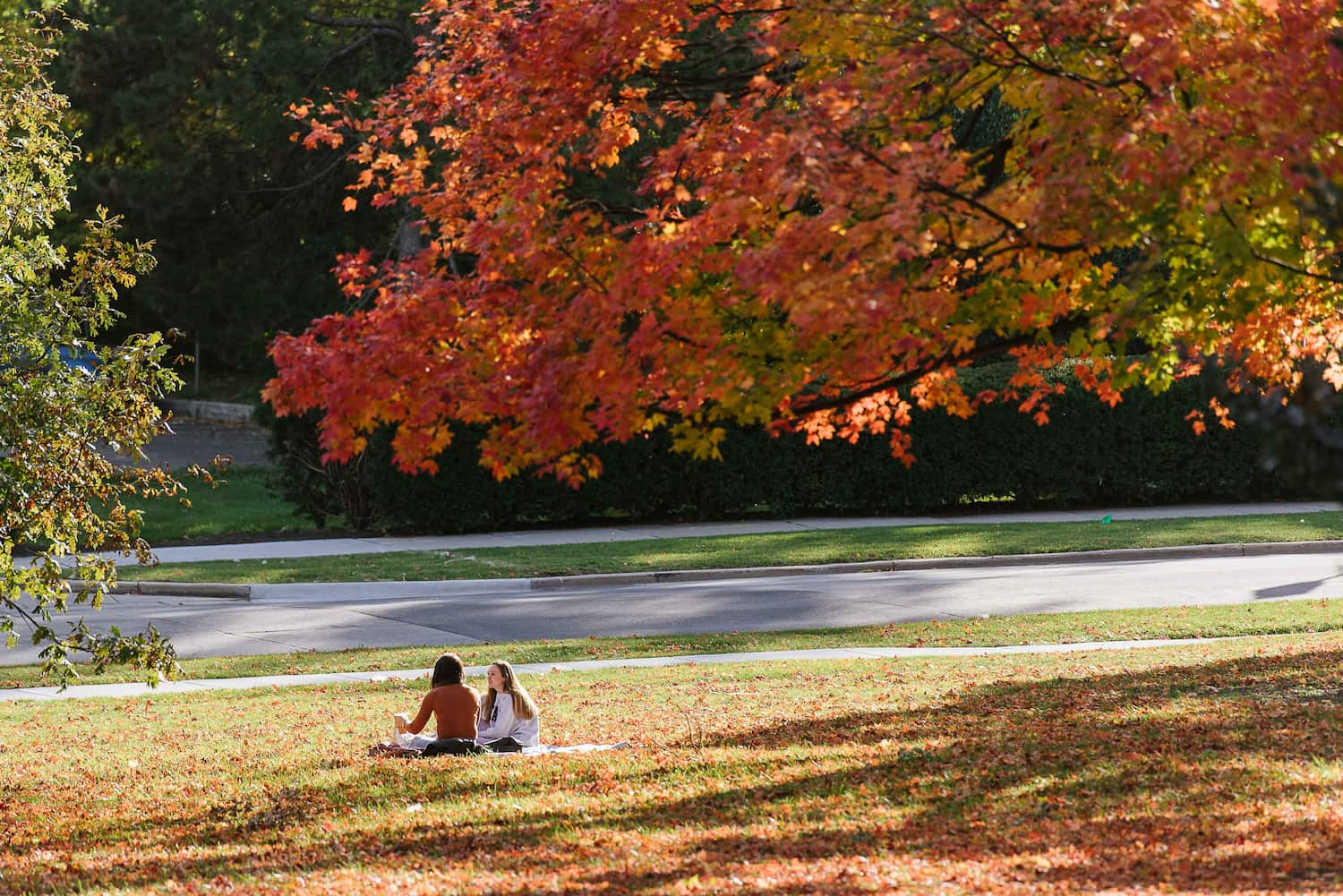
Friends catch up on life while enjoying Wheaton’s campus grounds.
In the realm of friendship research, Langan describes practices like intentional meals as “relationship maintenance” or rituals. Friendships lack the kind of rituals found in other significant relationships, such as in families where birthdays, anniversaries, and milestones are celebrated. Without the explicit commitment from their friends that they will be around in the future, Langan said, people often wonder, “Do you value our friendship in the same way? When push comes to shove, am I going to be eliminated?” This is why “relationship reassurances” can be so helpful in friendships where there is so much uncertainty.
Assistant Professor of Business Dr. Kate Min and her colleagues explored some of the uncertainty around friendship in research conducted during the pandemic, later published in The Journal of Personality and Social Psychology. Min noticed she was losing touch with many people that she used to run into naturally at the local coffee shop, office water cooler, or the gym. She thought about reaching out to these people via a “casual check-in” like a text message. This made her and her colleagues wonder why we don’t do this more often.
Through a series of 13 experiments involving more than 5,900 participants, Min and her colleagues found that people often underestimate how much their friends like to hear from them, fearing that their reach-out would not be appreciated. However, those who received these check-ins were positively surprised and appreciative of these small rituals of friendship.
“These findings made me think further about how people can cultivate friendships so that they can expand their social connections and not limit them to close friends only,” Min said. “I was encouraged to reach out to others I haven’t talked to recently without hesitation that they may not appreciate it or be bothered by it.”
Dr. Thomas Boehm, Associate Professor of Special Education and Director of the Wheaton Center for Faith and Disability, uses yet another word to describe the missing ingredient to friendship: trust. As Boehm studied the lives of people with disabilities and their social relationships, he found that “relationships grow at the speed of trust.”
That relational truth isn’t unique to people with disabilities, Boehm added. “It reveals what is common to all human beings. It makes the work that I do relevant not just in the disability silo but in the real landscape of human frailty and longing for community and connection.”
In a high-caliber academic setting like Wheaton, Boehm observes that proving our intellectual competency can get in the way of showing our weaknesses and vulnerability. But vulnerability is essential to creating a culture of trust. “Too often, we hide our vulnerability behind our strength and pretend we’re better than we are,” he said. “All the ways we talk about community—it’s all theoretical unless we’re doing the hard work of being vulnerable and being in the trenches with one another.”
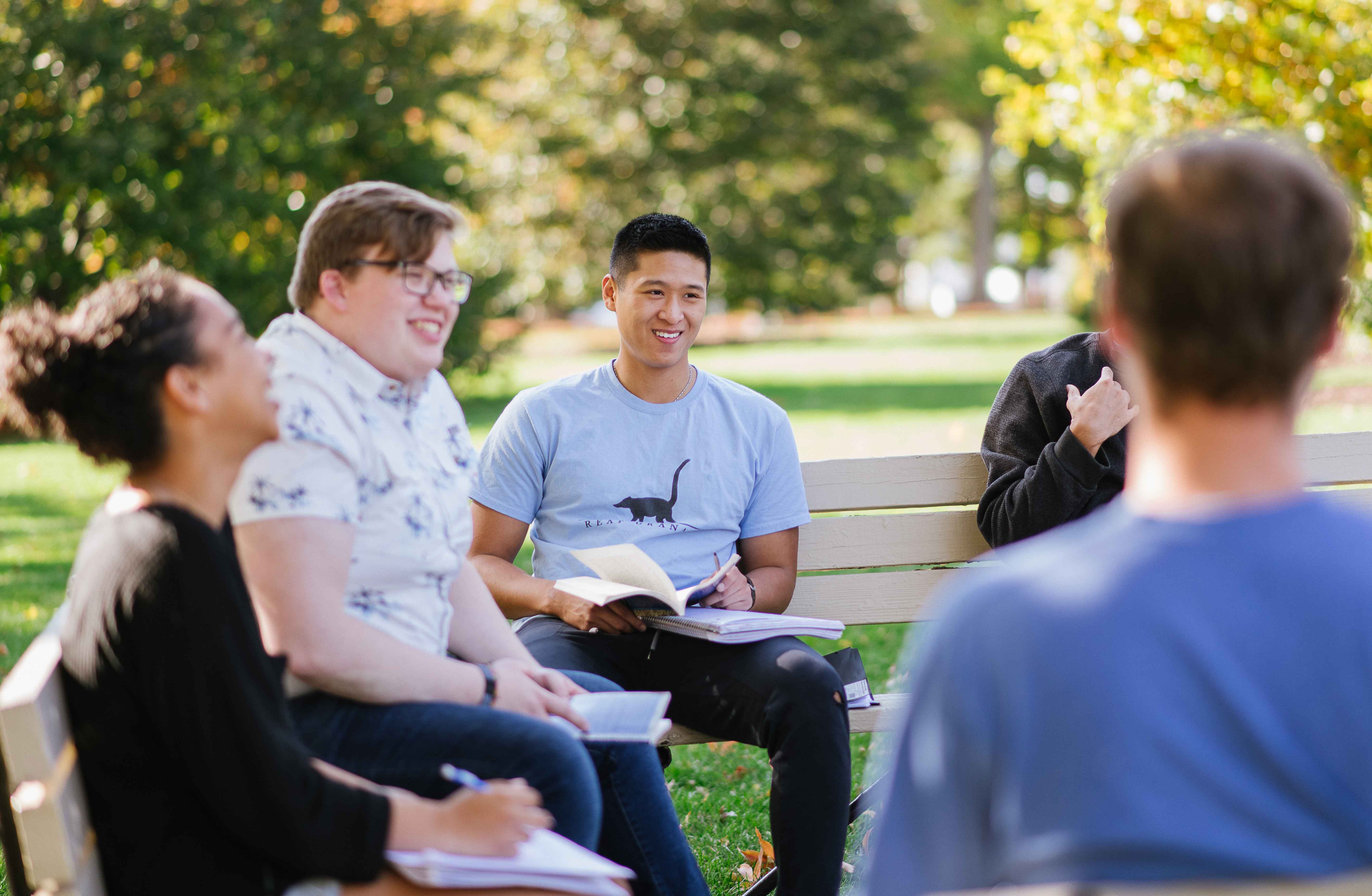
Students share a laugh during class.
Simple acts of vulnerability can transform a community. Gibson witnessed this six or seven years ago when he started noticing how students walked into class with their phones not just in their pockets or bags but in their hands, always attached to their bodies. “It seemed to me this wasn’t just about being informed,” he said. “It seemed like it was a protective barrier, a force field. It was keeping students from being together in the fullest possible way inside the classroom and out.”
But then Gibson detected a change when a student took the initiative to invite the entire class to lunch or dinner. “When that invitation happens, the whole class is transformed,” he said. After the group meals started happening, Gibson saw that students no longer pulled out their phones walking into class or during breaks. “They did not need to indicate they had a social group or protect themselves from feeling alienated from one another,” he said, “because they had friends.”
Paul’s word for hospitality in Greek is philoxenos: kindly or loving to the stranger. “There are special students on campus who have a gift for friendship,” Gibson said. “They are hospitable.”
AGAPE FRIENDSHIPS IN A WORLD OF TRANSACTIONAL RELATIONSHIPS
As Gibson studied the history of friendship and how various philosophers have thought about it, he came upon a curious argument. Some philosophers thought Christians shouldn’t have friends at all. Friendship was too partisan, too exclusive, in the face of our Christian calling to love all people. Was there such a thing, then, as a “Christian” friendship? And if so, what made it different from other friendships?
While cowriting the book Charitable Writing: Cultivating Virtue Through Our Words (InterVarsity Press, 2020) with Professor of English Dr. Jim Beitler ’02, M.A. ’04, Gibson found that Christians do have something that sets their relationships apart. It is the model Christ offers when he says to his disciples, shortly before his crucifixion, “Greater love has no one than this: to lay down one’s life for one’s friends” (John 15:13, NIV). That, Gibson realized, is the kind of friendship that Christ calls us to when he calls us friends.
Gibson and Beitler’s work together was challenging. They sometimes rewrote entire chapters of each other’s work. “I realized my friendship with Jim would only endure as a result of our mutual attempt to love each other in a self-sacrificial way,” Gibson said. Although he had been thinking about friendship and technology for years, it was the first time Gibson realized that Christians might have something that helps their relationships survive for the long haul.
“I don’t want to discredit other people’s friendships. All friendship is good,” Gibson said. “But I also think the undergirding of Christian friendship is agape love. I have some friends who I know are striving to love me as my Lord loves me. I can count on them in desperate circumstances to offer whatever they have to me. That’s part of what makes our friendship so satisfying and enduring.”

Blanchard Hall
Agape love is a high calling in a society that teaches us to “network” for strategic career motives, where people often enter into a relationship to get something out of it for themselves.
Miller sees this tension in his research on the suburbs, where—again—people prioritize family success over friendships. Over the past two decades, most books published on practicing faith in the suburbs have pushed against the societal current of surface-level and transactional relationships. “You should be forming relationships with people who have nothing to give you, nothing to offer you,” Miller said, summarizing a key theme in Dave Goetz’s 2006 book Death by Suburb: How to Keep the Suburbs from Killing Your Soul (HarperCollins, 2007). “That’s where you may truly meet God and meet people.”
Miller has seen some Wheaton students take these teachings to heart as they graduate. Some friend groups will decide to live together for one or two years post-graduation, focusing on relationships rather than careers. “That’s frowned on as delaying adulthood, but it poses a great question for Christians about what we value,” Miller said. “Is it about going out after graduation and finding the ‘best job’ and then finding people later? Or is it prioritizing relationships, friendships, and connections to a local church? I hope we would say that the latter are more meaningful in the long run.”
The early church may also have something to teach us here. Lee, who focuses on early Christian studies, particularly Augustine, points to the first monastic communities and their practice of intentional relationships. These groups formed as Rome became Christianized, and many used their faith to serve their political and social ambitions. “Monastics arise as a protest against a Christianity that is comfortable with luxury,” Lee said.
Amid glaring differences between the rich and poor, early monastics renounced personal wealth and possessions, living out a leveling egalitarian reality. Today, so many of our friendships form out of where we live, which in turn is often determined by income and social status. Although the early monastics didn’t perfectly embody their ideals, they at least started a discourse about how socioeconomic differences can divide us and how sharing our material possessions can foster a more intimate community.
Lee sees these dynamics play out in his own community on the west side of Chicago. He and his family have lived in Lawndale—a predominantly Black neighborhood—and attended Lawndale Christian Community Church for the past 11 years. Living in a community with many physical and social needs, he said, has a leveling effect.
“There are ways your possessions and luxuries are a spiritual handicap because they lend themselves so readily to pride and entitlement instead of understanding and empathy toward other people,” he said. In Lawndale, he sees people who are materially poor being elevated materially while the community helps the materially wealthy to become less indulgent, more materially generous, and more aware of their own spiritual poverty. “The poor benefit from material resources, while the rich benefit from the spiritual vitality of the community,” Lee explained.
From Lee’s perspective, the transformation happening in Lawndale is aligned with the impulses of early Christian monasticism, which sought to reckon faithfully with the spiritual and relational dangers posed by material inequity. “You can’t develop community across socioeconomic lines without holding on to your material possessions a lot more loosely,” he said.
Lee’s insights echo some of Jesus’ teachings in the Gospels: “It is easier for a camel to go through the eye of a needle than for someone who is rich to enter the kingdom of God” (Matt. 19:24, NIV). Our possessions can become a barrier to entry into the glorious give-and-take between all sorts of people from all walks of life that is the kingdom of God.
Although transformative friendships do take place on campus, Lee seeks to deepen students’ experiences by directing them off-campus through programs such as Wheaton in Chicago and the Aequitas Fellows Program in Urban Leadership. He believes transformation happens when students encounter communities who are different from them and become immersed in these experiences, stories, and relationships.
“I can have students read articles on sociology or urban studies or race until they’re blue in the face, and that would not have the same effect as simply spending some time in a community that has experienced significant racial injustice, and you can see the concrete effects,” Lee said. “And yet, despite all that, you find communities of warmth, vibrancy of faith, and generosity toward outsiders.”
In a society that is still so segregated by race and social status, so driven by markers of success and strength, what can propel us into vulnerability and openness toward those whose very differences have the capacity to transform us? Maybe the answer goes back to Christ’s call to us—to receive his friendship based on self-giving love and, in turn, extend it to others.
THE ECOLOGY OF RELATIONSHIPS
By the windows of Billy Graham Hall’s fifth floor, sophomore Mia Olsen sat side by side with a friend as they both journaled about their relationship with God. After writing in silence for a while, the friends looked up. “Wow, the Lord is so good,” Olsen said, kicking off a time of mutual sharing about how they’re growing in faith and how they can support one another in rising up to God’s call on their lives.
Across campus, Miller swiped his card at Anderson Commons and chatted with Rosa Kader, the friendly staff member who has greeted so many in the dining hall. Miller, now a professor at Wheaton, has known Kader for nearly two decades, since he was a student at Wheaton and worked in the cafeteria swiping cards. He asked about her weekend, which Kader had spent with her grandkids. They laughed and commiserated over how much energy it takes to be with young children.
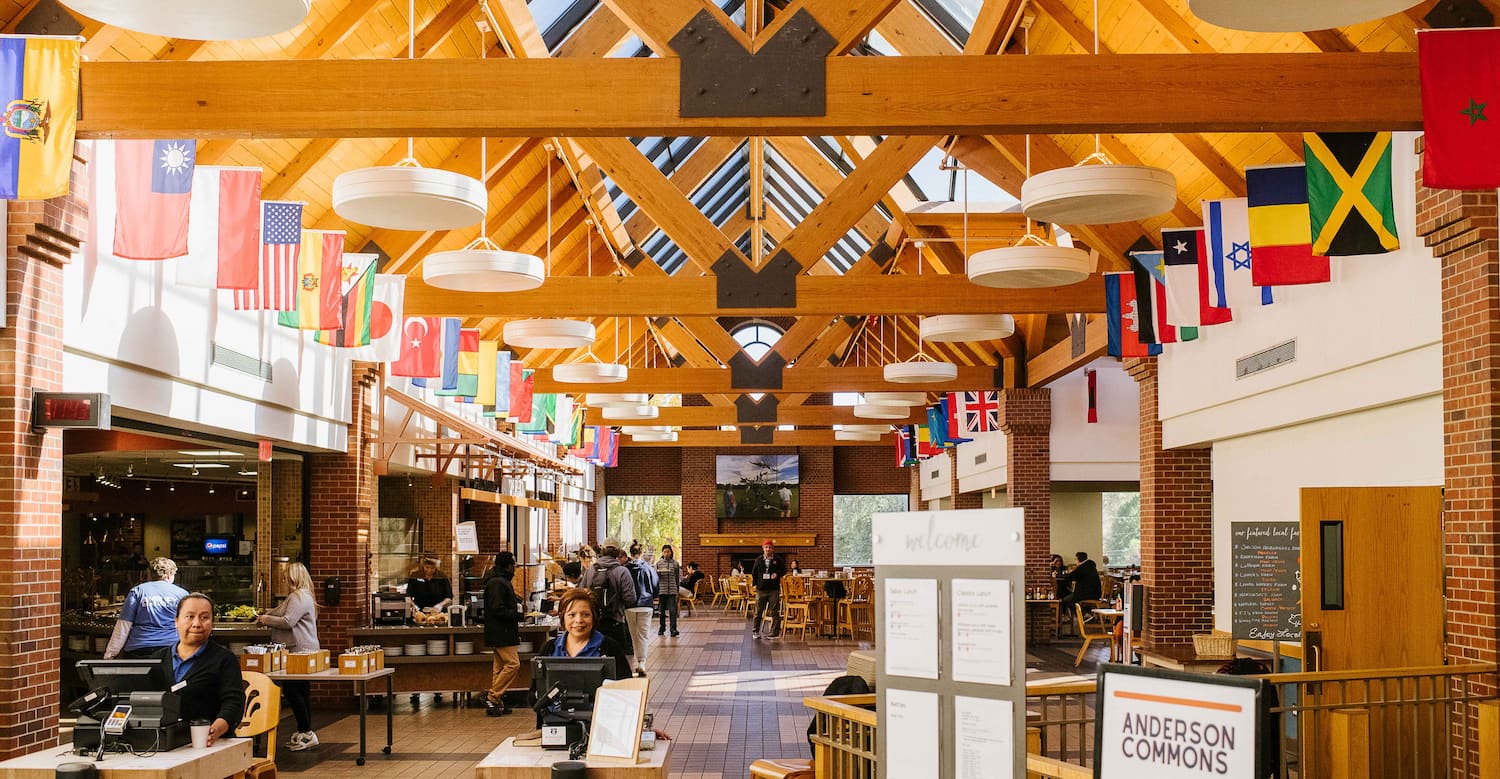
Rosa Kader (center) greets diners in Anderson Commons.
In Blanchard Hall, Gibson flipped through the pages of a book he inherited from his fellow English department colleague Brett Foster after Foster’s death in 2015. Because Foster was such an active annotator, when Gibson reads his scribbled margin notes, he feels he is watching Foster working. “His death created a gap, an absence that will never be filled, but it knit those who love him closer,” said Gibson, speaking of many faculty members whom Foster befriended. “It really did teach me that friendship is not just a lifespan issue. We continue to have a relationship with our friends even posthumously. It happens through our continuing memories.”
The examples above are among the many types of friendships that links members of the Wheaton community and beyond. While lifelong friendships among students are what many readers may think of when it comes to Wheaton friendships, faculty members stress that these student relationships incubate in the context of a long-standing network of relationships among faculty members and staff, built upon years of shared work and life. “There’s this arc of friendship that students are dropped into, which they might not even realize, but it’s a part of the ethos of Wheaton,” Haase said. “My students might not have touch points with any of my faculty friendships on campus, but it shows up in the classroom.”
Gibson’s desire for students is that they form a rich ecology of relationships, of which friendship is one element. “I want them to have a variety of friendships—to varying degrees of strength that they can call upon in addition to family,” he said.
Langan stresses that different friends walk with us in different seasons of life. “Can we practice the principles of friendship throughout our lives, even if it’s not with the same people?” Langan asked. “That’s a pretty valuable lesson about friendship that a lot of us are missing.”
Short- or long-term, in-person or from afar, and amid changing life circumstances, friendship done well can point to Christ, who offers us a life-giving friendship that we can all gather around. Haase pictures Christian friendship as coming together at the table of Christ, a complicated table that invokes his death. But serious conversations happen here, and we keep coming, despite our differences. Or perhaps, we keep coming because of them and because we know they can be held and honored when we share a meal together.
“This is where we as Christians have such a beautiful story to tell,” Haase said. “They will know you are Christians, how? By being friends.”
